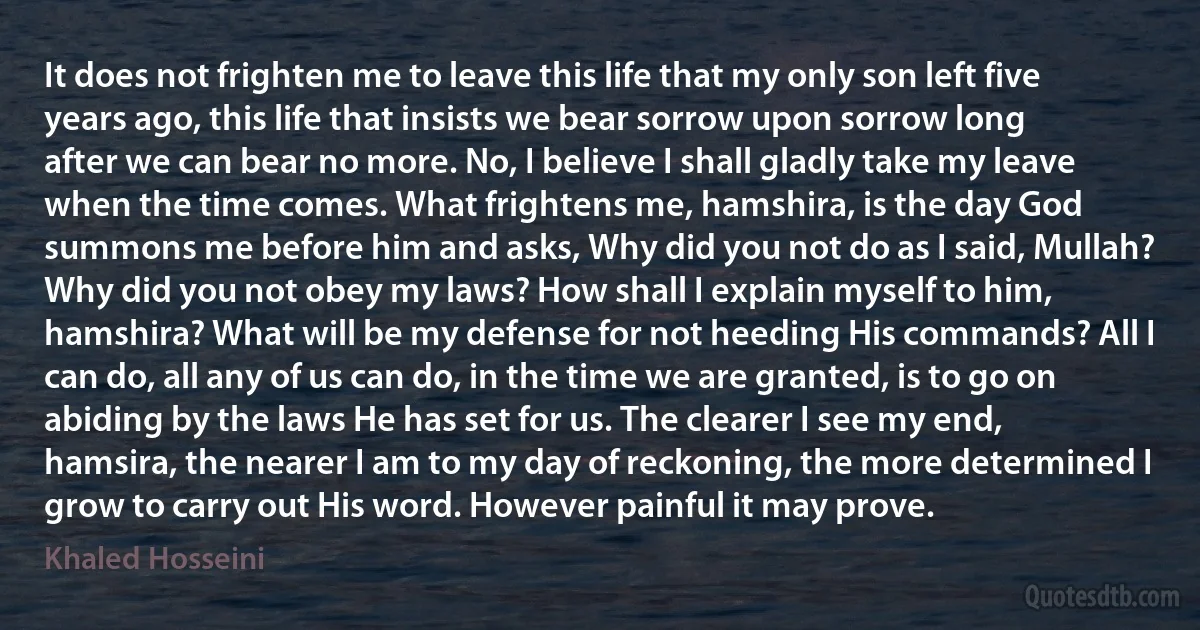Reckoning Quotes - page 2
In case of actual danger, the social democracy banks not on the "Iron Front" but on the Prussian police. It is reckoning without its host! The fact that the police was originally recruited in large numbers from among social-democratic workers is absolutely meaningless. Consciousness is determined by environment even in this instance. The worker who becomes a policeman in the service of the capitalist state, is a bourgeois cop, not a worker. Of late years, these policemen have had to do much more fighting with revolutionary workers than with Nazi students. Such training does not fail to leave its effects. And above all: every policeman knows that though governments may change, the police remains.

Leon Trotsky
It could and must, be explained that in the civil war we destroyed the White Guards in order that they should not destroy the workers. Consequently, our problem is not the destruction of human life, but its preservation. But as we have to struggle for the preservation of human life with arms in our hands, it leads to the destruction of human life - a puzzle the dialectical secret of which was explained by old Hegel, without reckoning other still more ancient sages.

Leon Trotsky
And so on – among the highest piles of rubble in the world of the sacred temples of another religion, among the highest piles of corpses of those venerated by another religion. Yet, in the reckoning of our eminent historians a policy of ‘Broad Toleration'! A policy of toleration guided by purely secular motivations!

Arun Shourie
Some anti-Americanism derives simply from our being a colossus that bestrides the earth. This resentment may be incurable. But much anti-Americanism derives from the role U. S. political, economic, and military power has played in denying such freedoms to others. U. S. foreign policy has to be rethought. It needs not tweaking but overhauling. We need: a historical reckoning with crimes committed, sponsored, or permitted by the United States. [.. ] A country has to look back before it can move forward. Instituting a doctrine of the mea culpa would enhance our credibility by showing that American decision-makers do not endorse the sins of their predecessors. When Brandt went down on one knee in the Warsaw ghetto [in 1970], his gesture was gratifying to World War II survivors, but it was also ennobling and cathartic for Germany. Would such an approach be futile for the United States?

Samantha Power
And how does the God's existence emerge from the proof? Does it follow straightway, without any breach of continuity? Or have we not here an analogy to the behavior of the little Cartesian dolls? As soon as I let go of the doll it stands on its head. As soon as I let it go – I must therefore let it go. So also with the proof. As long as I keep my hold on the proof, i. e., continue to demonstrate, the existence does not come out, if for no other reason than that I am engaged in proving it; but when I let the proof go, the existence is there. But this act of letting go is surely also something; it is indeed a contribution of mine. Must not this also be taken into the account, this little moment, brief as it may be – it need not be long, for it is a leap. However brief this moment, if only an instantaneous now, this "now" must be included in the reckoning.

Søren Kierkegaard
In order that men should embrace the truth - not in the vague way they did in childhood, nor in the one-sided and perverted way presented to them by their religious and scientific teachers, but embrace it as their highest law the complete liberation of this truth from all and every superstition (both pseudo-religious and pseudo-scientific) by which it is still obscured is essential: not a partial, timid attempt, reckoning with traditions sanctified by age and with the habits of the people - not such as was effected in the religious sphere by Guru Nanak, the founder of the sect of the Sikhs, and in the Christian world by Luther, and by similar reformers in other religions - but a fundamental cleansing of religious consciousness from all ancient religious and modern scientific superstitions.

Leo Tolstoy
As we find ourselves in jobless economies, societies in which small minorities consume while the masses starve, we find ourselves forced to rethink the rationale of our current globalization and to ponder the Gandhian alternative.
At a time when Freud was liberating sex, Gandhi was reining it in; when Marx was pitting worker against capitalist, Gandhi was reconciling them; when the dominant European thought had dropped God and soul out of the social reckoning, he was centralizing society in God and soul; at a time when the colonized had ceased to think and control, he dared to think and control; and when the ideologies of the colonized had virtually disappeared, he revived them and empowered them with a potency that liberated and redeemed.

Nelson Mandela
The reckoning with idealism as a view of life is universal, but it also touches on something central in art-its life's substance. One must understand that it is impossible to distinguish between a picture's form and its substance. As the flower's structure is governed by the intentional tension (when it loses the sap the form is lost), so also with art the substance creates the tension. Form and substance are one and the same. Form is the life expression and substance the living painting.

Asger Jorn
In this Bicentennial Year, we are commemorating the anniversary dates of many great events in American history. An honest reckoning, however, must include a recognition of our national mistakes as well as our national achievements. Learning from our mistakes is not pleasant, but as a great philosopher once admonished, we must do so if we want to avoid repeating them.

Gerald Ford
Dialogue in Hell:
finally comes the liquidation which adds 15, 20, or 30 millions. In short, in the general reckoning, the total of the unforeseen expenses forms one-third of the estimated expenditures. It is upon this last figure that the legislative vote of the Chambers falls as a form of confirmation. In this way, at the end of ten years the budget can be doubles and even tripled....
Monsesquieu:... It is certain that there are few governments who are not obliged to have recourse to borrowing; but it is also certain that they are obliged to make use of them sparingly; they could not, without immorality and danger, encumber future generations with exorbitant burdens, out of all proportion to.

Will Eisner
We trust the good Maker has opened your eyes to the wrongs which you and your fathers have done to me and my fathers, in making us toil for you for generations without recompense. Here I draw my wages every Saturday night; but in Tennessee there was never any pay-day for the negroes any more than for the horses and cows. Surely there will be a day of reckoning for those who defraud the laborer of his hire.

Jordan Anderson
In Plato's Republic, when the interlocutor of Socrates appears to bring certain plausible reasons to bear upon the mathematical sciences, to show that they are useful to human life, arithmetic for reckoning, distributions, contributions, exchanges, and partnerships, geometry for sieges, the founding of cities and sanctuaries, and the partition of land, music for festivals, entertainment, and the worship of the gods, and the doctrine of the spheres, or astronomy, for farming, navigation and other undertakings, revealing beforehand the proper procedure and suitable season, Socrates, reproaching him says: "You amuse me, because you seem to fear that these are useless studies that I recommend; but that is very difficult, nay, impossible. For the eye of the soul, blinded and buried by other pursuits, is rekindled and aroused again by these and these alone, and it is better that this be saved than thousands of bodily eyes, for by it alone is the truth of the universe beheld."

Nicomachus
I think it's important for anyone who takes cinema seriously not to limit yourself to just optimistic or happy movies. I think that's a problem. You've got to be willing to let the art of cinema take you into some darker places if you're going to make full use of it. There are some people who shouldn't watch horror films, and I'm all right with that. It's not about putting something evil in the world. It's about reckoning with evil. We don't need any more evil in the world. We need a lot more reckoning with it.

Scott Derrickson



